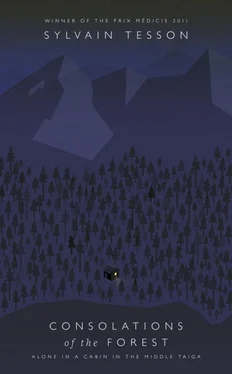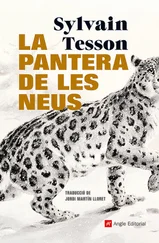11 JULY
The German kayakers set out again in their perfectly organized craft. At the same moment, four other oarsmen show up in my bay. These men are not nearly as well equipped. Crappy gear: Russians. They’re using refuse bags as watertight skirts for the hatch coamings. They’re dressed like sailors and they accept the three shots of rotgut the Teutons declined (on the grounds that it was too early in the day). Germans and Russians: the former would like to put the world in order, while the latter must endure chaos to demonstrate their genius.
The last visit of the day is worthy of the Balkan cinema of the 90s. From the north, heralded by cannonfire, a raft of planks floating on Ural truck wheel inner tubes comes drifting towards my shore. In the centre of this floating island, enthroned on beams and braced by cables, sits a jalopy. Three Russians in full fatigue dress leap out onto the shingle: ‘Our raft is called The Intrepid !’ They’ve got the mugs of killers, striped submariner middy blouses, and daggers in their belts. The car’s universal joint has been pulled off its axis, tipped 20º, and equipped with a propeller. On this Kon Tiki from hell they are heading down to Irkutsk, taking turns piloting from the driver’s seat. At the stern, a wood fire in an oil drum serves as a kitchen. When they leave, they fire off a small portable cannon, and I contemplate this raft, so much like life in Russia: an unwieldy, dangerous thing on the verge of shipwreck, a slave to the currents – but aboard which you can always make tea.
That evening, at the waterfall, while Hermann guards the home front, Goisque and I succeed in crossing the torrent above the falls. We reach the granite ridge where I’d found a good camping ledge during the winter. It takes us an hour to cover the last fifty yards of uneven terrain, defended by dwarf pines that catch our feet in their branches.
On the platform, I build a fire. The traverse is a lodge for a vigil of arms, one of those places where you make peace with yourself before a dawn execution. The kind of spot where – depending on your mood – you are flooded with either darkest despair or radiant joy. We smoke our Romeo No. 1 cigars; the night is calm, the moon already almost full. Why this desire to remake the world just when it’s going out? Cumulus clouds obscuring the Buryat horizon ripen in the setting sun. The four elements play their parts. The water welcomes the shavings of lunar silver, the air is laden with fog, and the stones shimmer with banked heat. Why believe that God is anywhere else but in a sunset? The dogs are flopped out under the pines. The fire burns higher; night falls. They meet.
Suddenly Aika darts down the slope with fangs bared, while Bek huddles under the pines like an apartment dog lost out on the taiga. The little black watchdog barks in the darkness and we imagine a bear circling our camp.
12 JULY
Goisque, Hermann and I are walking in silence on the beach at Middle Cedar Cape. In his Life of Rancé , Chateaubriand, crushed by modesty, remembers having walked along ‘under the weight of my mind’.
At the tip of the cape, a moment of reflection at the cabin where that soul shipwrecked by the Red Century rotted away. Hermann: ‘A life without ever hearing a game-show host.’ In a clump of dwarf pines, on the shingle ridge that divides Baikal from the inland ponds, the dogs flush out a sitting duck, and we must restrain them from putting paid to the eggs. Aika still manages to gobble up a little live sparrow, to the dismay of Hermann, who has been a strict vegetarian for forty years.
The six o’clock sun has transformed the marsh into forest pools in an Arthurian wood. The mists of legends float across the water, parting at times to release a thousand darting diffractions in a scene tailor-made for a Victorian Gothic writer. In a fantasy novel of the late nineteenth century, dragonflies would become the winged steeds of fairies, the light flashing on the water would be the kisses of undines, the mist, the breath of sylphs, and spiders would stand guard over the gates of the wind, while the still waters would shelter the cave of a tutelary god, and the rays of the setting sun, shooting grandly up over the mountain crests, would symbolize the golden road to the realms of Heaven. But we’re mere men in a world of atoms and must get home before dark.
13 JULY
The Europeans have proceeded with the construction of third-generation pressurized water reactors, relaunched the Transgreen Project aiming to import solar energy produced in the Sahara, and there’s a massive black tide offshore of Florida. I read these chronicles of human demiurgy in the newspapers Goisque brought with him.
Life in the cabin is a profession of faith in a form of energy that has nothing to do with man’s age-old ambition to master the universe. The woodcutter’s axe and the solar panel provide light and heat. Being frugal with energy is not a burden. Neither is the satisfaction of knowing one is self-sufficient, nor the spiritual comfort of enjoying the prodigality of the sun. Photovoltaic panels capture the photons showering down from the sky, and wood – which is fossilized solar light – releases its energy in fire.
Every calorie drawn from fishing or gathering, each photon assimilated by the body, is spent to fish, gather, draw water and chop wood. The woodsman is an energy-recycling machine. Relying on the forest is a form of self-reliance. Without a car, the hermit walks. Without a supermarket, he fishes. Without a boiler, he chops wood. The principle of non-delegation concerns the mind as well: without a TV, he opens a book.
What do oil and uranium look like? What does the containment building of a pressurized water reactor contain? What is the composition of the crude oil flowing from the BP well-head two and a half miles down? Who transforms these forces and brings them to us in the form of watts? Cabin communism means eliminating intermediaries. The hermit knows where his wood and water come from, along with the meat he eats and the wild rose perfuming his table. The principle of proximity guides his life. He refuses to live in the abstraction of progress and draw upon an energy source about which he knows nothing. To be ‘modern’ means refusing to worry about where the benefits of progress actually come from.
The other news in the paper concerns the corruption of the personnel of the French state, who sometimes betray a confounding clumsiness in hiding their malfeasance. Even the valets of the Marquis de Sade remembered to lock the doors of their master’s boudoir. The ugliness of the men in suits and their impoverished command of the language are worse than their crimes.
14 JULY
The sun hoists the colours at 4 a.m., and I raise mine a little later. I’ve only three – sky, snow, blood – and the little flag snaps on the beach, flying from a fishing pole. For the fatherland on Bastille Day, Goisque, Hermann and I down three times three vodka eye-openers. We salute the memory of Borodino, the bloodiest day of the French invasion of Russia – indeed, of all Napoleon’s wars. I organize some ‘dancing in the streets’ and teach Bek how to waltz. Aika, the bitch, refuses to dance. Is it legal to plant the French flag on the soil of Russia? Is it a provocation? I must remember to ask the next constitutional scholar who paddles by in a kayak.
15 JULY
Goisque and Hermann left this morning. Their friendly presence and the constant stream of rowers these past few days have screwed up my internal clock, and it will take me a few days to recover a rhythm based exclusively on the observation of the sun’s progress around my clearing.
16 JULY
Cabin life is like sandpaper. It scours the soul, lays bare one’s being, ensavages the mind, and reclaims the body for the wild, but deep in the heart it unfolds the most sensitive nerve endings. The hermit gains in gentleness what he loses in civility. ‘The less sensitive he was to suffering, perhaps, the more receptive our ancestor was to pleasure, and the more conscious of his happiness,’ writes Bachelard in The Psychoanalysis of Fire .
Читать дальше












